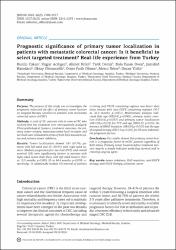Prognostic significance of primary tumor localization in patients with metastatic colorectal cancer: Is it beneficial to select targeted treatment? Real-life experience from Turkey

Göster/
Erişim
info:eu-repo/semantics/openAccessAttribution 4.0 Internationalhttps://creativecommons.org/licenses/by/4.0/Tarih
2021Yazar
Çakan, BurçinAçıkgöz, Özgür
Bilici, Ahmet
Demir, Tarık
Öven, Bala Başak
Hamdard, Jamshid
Olmuşçelik, Oktay
Ölmez, Ömer Fatih
Şeker, Mesut
Yıldız, Özcan
Üst veri
Tüm öğe kaydını gösterKünye
Çakan, B., Açıkgöz, Ö., Bilici, A., Demir, T., Öven, B. B., Hamdard, J. ... Yıldız, Ö. (2021). Prognostic significance of primary tumor localization in patients with metastatic colorectal cancer: Is it beneficial to select targeted treatment? Real-life experience from Turkey. Journal of B.U.ON., 26(5), 1908-1917.Özet
Purpose: The purpose of this study was to investigate the prognostic value,and the effect of primary tumor location on targeted therapy selection in patients with metastatic colorectal cancer (mCRC). Methods: A total of 201 patients with de novo mCRC who received first line treatment were retrospectively analyzed. Clinicopathological features, treatment outcomes, the primary tumor surgery, metastasectomies/local therapies and survivals were evaluated in terms of both RAS mutation status and primary tumor sidedness. Results: Tumor localization showed 140 (69.7%) patients with left-sided and 61 (30.3%) with right-sided tumors. Median progression-free survival (PFS) and overall survival (OS) were significantly shorter in patients with right-sided tumor than those with left-sided tumors (10.1 vs 12.9 months, p=0.005; 25 vs 44.4 months, p=0.008, respectively). In addition,the median OS interval of patients receiving anti-VEGF containing regimen was better than those treated with anti-EGFR containing regimen (50.7 vs. 26.9 months, p=0.001). Multivariate analysis indicated that age (HR:0.41,p=0.045), primary tumor resection (HR:0.41,p=0.037) and primary tumor localization (HR:0.38,p=0.021) for PFS and age (HR:0.39, p=0.09), the presence of BRAF mutation (HR:0.59,p=0.019) and the type of targeted therapy (HR:3.16,p=0.025) for OS were independent prognostic factors. Conclusions: Our results showed that primary tumor location is a prognostic factor in mCRC patients regardless of RAS status. Primary tumor location before treatment decision may be a simple indicator predicting survival and in choosing targeted agent.
Scopus Q Kategorisi
Q3Kaynak
Journal of B.U.ON.Cilt
26Sayı
5Koleksiyonlar
- Makale Koleksiyonu [3777]
- PubMed İndeksli Yayınlar Koleksiyonu [4230]
- Scopus İndeksli Yayınlar Koleksiyonu [6574]


















